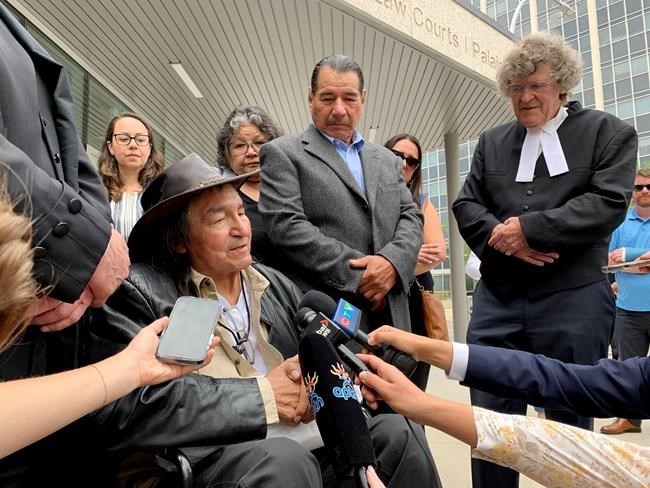WINNIPEG — A courtroom erupted in cheers and applause Tuesday after a Manitoba judge said the words two First Nations men have been waiting a half-century to hear.
"You are innocent. You deserve acquittals. I'm now happy to enter them," Chief Justice Glenn Joyal of the Court of King's Bench told Brian Anderson and Allan Woodhouse.
"Your stories are stories of courage and resilience."
Systemic and individual racial discrimination within the justice system played a part in the wrongful conviction of both men, added Joyal.
"We cannot permit this type of wrongful conviction to occur … without the outrage they deserve."
Anderson and Woodhouse were sentenced to life in prison when they were teens for the killing of Ting Fong Chan, a restaurant worker who was stabbed to death in 1973 near a downtown construction site.
The two men, who are from Pinaymootang First Nation north of Winnipeg, have proclaimed their innocence for the past five decades.
In the years that followed their conviction, Anderson and Woodhouse appealed to higher courts but were denied.
Following Joyal's decision, Anderson, 68, said he's been holding onto hope that one day the courts would recognize his innocence.
"It's what I wanted to hear. I've been waiting for that for the last 50 years."
The men's convictions were based largely on a signed confession given by Anderson to police. But the men's lawyers have said Anderson did not know what he was signing and English was not his first language.
On a U.S.-based podcast last year, Anderson said he signed a piece of paper that he thought was a receipt for his personal property that he had surrendered upon his arrest.
Lawyers for the men told the court Tuesday that at the time of the Anderson's arrests police used "physical violence and threats" to obtain a confession.
Police arrested the men based off accounts from two unreliable eyewitnesses and the only evidence presented at trial was the alleged confession, said Jerome Kennedy, one of the men's lawyers and director of the non-profit legal organization Innocence Canada.
"These young men didn't have a chance. They had been labelled," said Kennedy.
Federal Justice Minister David Lametti ordered a new trial in June for the two men, citing unspecified new evidence.
Lametti said in a statement last month he was satisfied there was a reasonable basis to conclude a miscarriage of justice likely occurred.
The Crown asked for an acquittal of Anderson and Woodhouse on Tuesday, saying systemic racism had affected the investigation and prosecution.
"Our justice system failed," Crown attorney Michelle Jules told Joyal on Tuesday. "Failed to provide them a fair trial."
Jules offered an apology to Anderson and Woodhouse and their families.
Following Joyal’s decision, people hugged and some began to cry.
Both men took to the stand to profess their innocence and share with the court the impact their convictions had on them and their families.
Woodhouse, 67, spent 23 years in prison.
"It’s unbelievable to be accused of something you didn’t do," he told the court. "I sent my family off because I didn’t want my family to see me while I was in prison."
Woodhouse told reporters afterward he believed he was arrested because of the colour of his skin.
"Had it not been racism, I don't think we would have been in court at all."
Anderson was released on parole in 1987 and Woodhouse in 1990.
Manitoba Justice Minister and Attorney General Kelvin Goertzen said Tuesday he believes a miscarriage of justice took place.
He offered his apologies to Anderson, Woodhouse and their families, but noted “nothing that can be said that will bring back the years of lost freedom or the time away from family and friends.”
He said the wrongful conviction has also caused hardship for Chan’s family, as they’ve sought justice over the past 50 years.
“This miscarriage of justice compounds the suffering of the Chan family as well, and as attorney general, I regret and recognize this hardship,” Goertzen said in a statement Tuesday.
Kim Beaudin, vice-chief of the Congress of Aboriginal Peoples, said he believes systemic racism was a driving force behind what happened.
“Both provincial and federal governments should be paying attention to these cases to see the results of racism, prejudice and overrepresentation of our people in prisons,” Beaudin said.
James Lockyer, one of the men's lawyers and another director of Innocence Canada, said there needs to be an examination of homicide convictions involving Indigenous people over that last five decades within the province. Two other men were convicted in Chan's death besides the ones acquitted Tuesday.
The men's lawyers did not rule out future legal action against the province, but for now, Kennedy said his clients can breath a sign of relief.
"Today is a day of celebration."
This report by The Canadian Press was first published July 18, 2023.
— With files from Jeremy Simes in Regina.
Brittany Hobson, The Canadian Press



